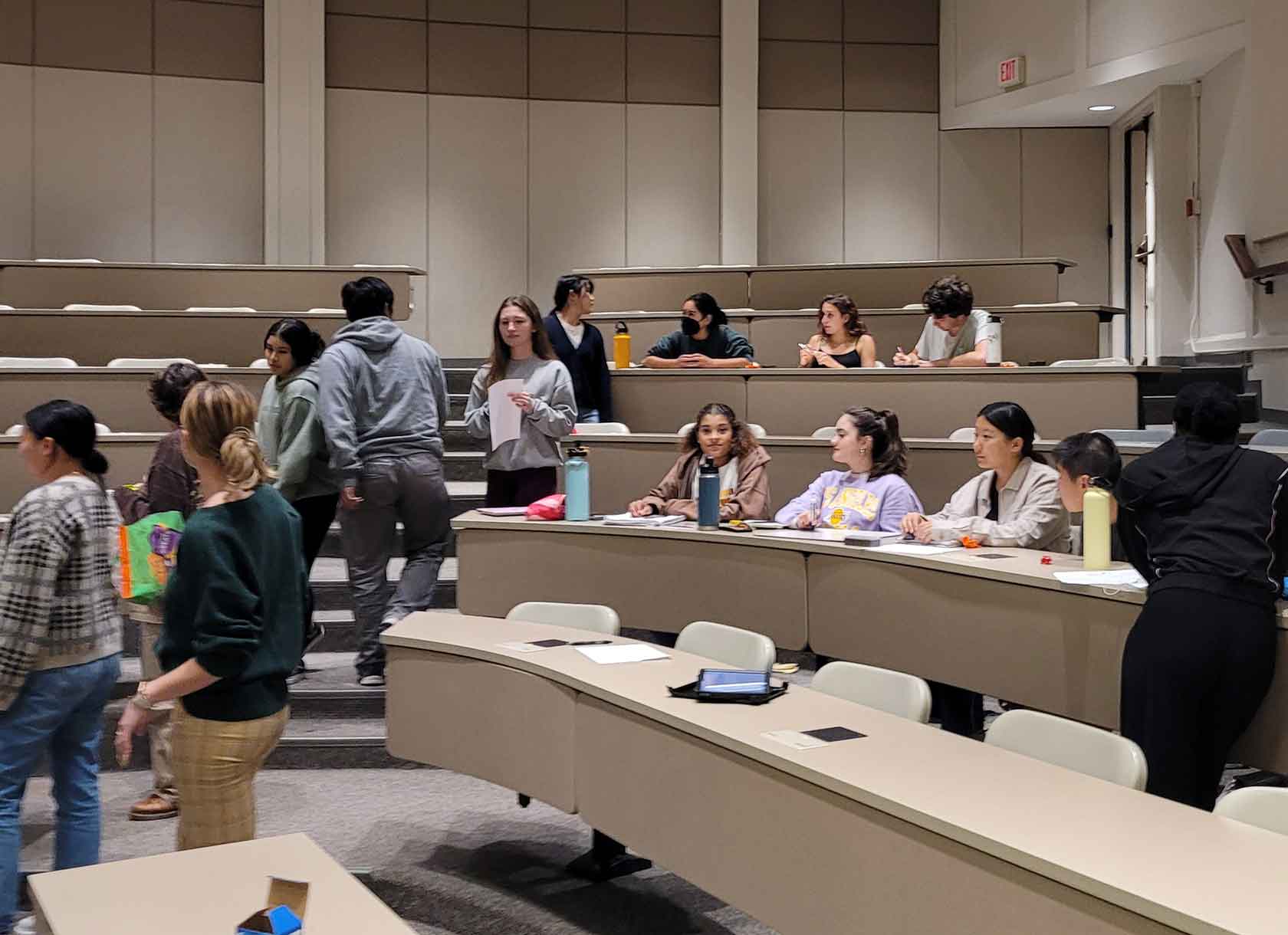By Katie Hanson ’25

On Wednesday, October 26, the Bauer Forum at Claremont McKenna College was buzzing with excitement: More than 40 students enrolled in Basic Principles of Chemistry (general chemistry) courses at the W.M. Keck Science Department joined together to compete in the department’s annual Dot-Off. After forming teams based on the seven sections of the course, each team was assigned a molecule for which they had to draw a Lewis Dot Structure, a diagram showing the molecule’s unique electron arrangement around each of its atoms. At stake: doughnuts for the winning team and a scepter for their professor.
While the Dot-Off was an opportunity for students to study before their upcoming test, it was also an opportunity to encourage collaboration within STEM.
“Chemistry can be scary and intimidating, and so having events that are fun around it helps with the community-building aspect,” says Professor of Chemistry and Associate Dean of Faculty for Racial Equity Mary Hatcher-Skeers. “The Dot-Off turns studying chemistry from an isolated activity to this community of groups that loudly cheer for each other.”
Hatcher-Skeers hosted this year’s event, selecting and announcing the molecules to the teams. She says the department minimizes staff involvement so that students can learn without the fear of their professors watching. For that reason, the event is largely reliant on peer educators: teaching assistants who come to support their course section and check their team’s answers.
Loren Mello ’24, an environmental analysis and dance double major, is a peer educator for this year’s winning section. While all Keck classes are led by professors, peer educators assume a unique role in providing student-to-student academic support. All peer educators have previously taken and excelled in the classes they support. To serve as an additional resource for students, Mello attends every class of her general chemistry section and holds two hours of office hours weekly.
Mello says her section’s win was hard fought. After the final question, three teams still had perfect scores. The teams went into a series of tiebreaker rounds until finally, with a sudden death question, her team prevailed.
Mello agrees that bringing collaboration and camaraderie to science classes is necessary, given some of the current and historical challenges in the field.
“Science has not been a very collaborative discipline,” she says. “As a pre-health student myself, I think that we’re facing a lot of issues in healthcare, and the only way we’re going to solve that is by working together. I think events like this that are competition based, but really emphasize collaboration at their core, are super important. It still offers an opportunity to have fun with your peers.”
Visiting Assistant Professor of Chemistry Amy Babbes was excited to help with the planning and logistics of the event. For Babbes, who teaches three sections of the general chemistry class, including this year’s winning team, receiving the scepter was a symbol of her students’ hard work. For several years in a row, Babbes has been able to hold the scepter in her office. This year, one of her other sections won donuts for having the highest turnout rate.
“My students are the ones doing the work,” Babbes says. “I think it’s kind of ironic that the instructors get to hold the scepter. It’s to my students’ credit that they came prepared and that they knew what they were doing.”
Blu Bologna Gitti ’26, one of Babbes’ students, was happy to do this work. They came to the Dot-Off to study for the upcoming exam in a supportive, productive group environment. Although Bologna Gitti’s team didn’t win the scepter, they earned doughnuts for the highest turnout rate, and Bologna Gitti felt the event was helpful and rewarding.
“Studying can be very daunting,” they say. “It was very nice to have this teamwork-based, fun game where you get doughnuts at the end. It’s a nice way to motivate yourself to do work and study and also have fun with it and not get totally stressed out.”
This year marked the Dot-Off’s approximated 25th anniversary. Faculty members aren’t entirely sure when it started, largely because the event predated their arrival at Keck. Nevertheless, this year’s Dot-Off was also historic in that it was the first time the event was held in person since the beginning of the pandemic in spring 2020. Faculty and student leadership plan to continue the event because of the high student participation and the community building it encourages.
“Belonging in science is one of the things that leads to retention in science,” Hatcher-Skeers says. “Anything we can do to help students create community, enjoy the process, and know that there are other people they can study with is huge.”

